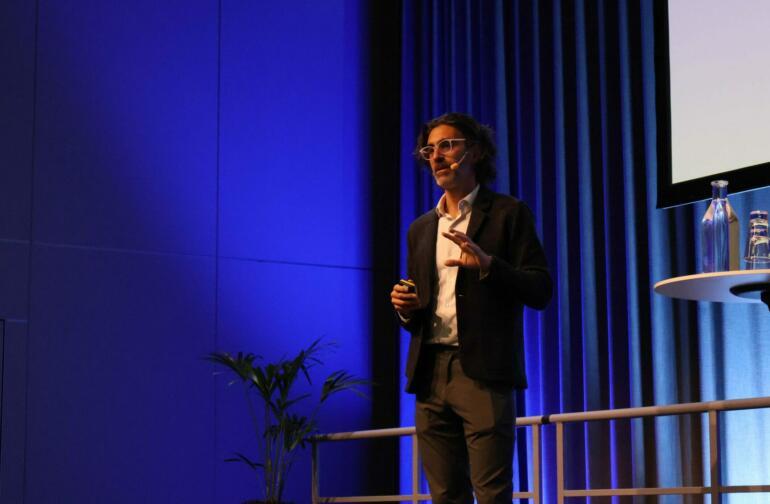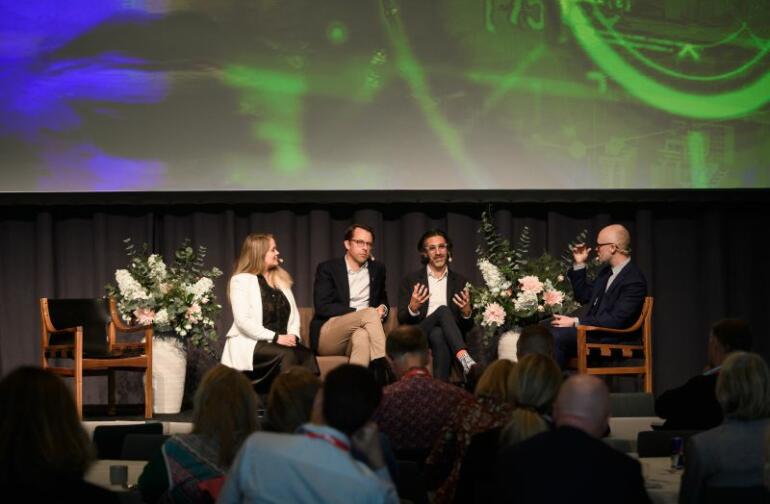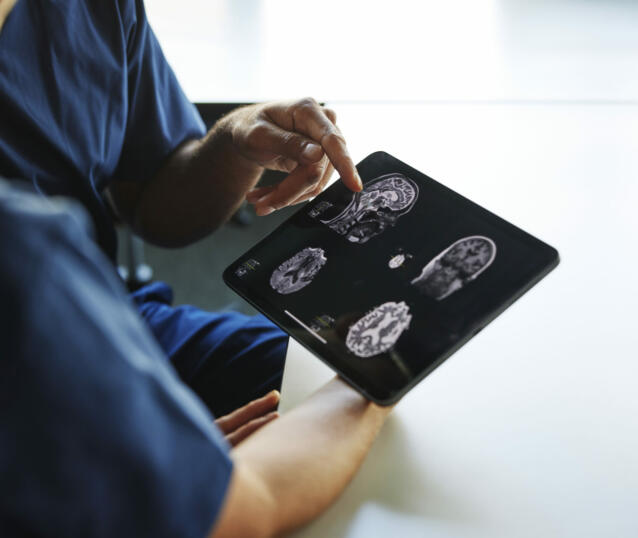From California to “Hallifornia”: Why one of the world’s top AI pioneers is teaming up with Region Halland
Ebba Cameron
Ziad Obermeyer at Vitalis talking about ”Reinventing Medicine with AI”

Ziad Obermeyer is a physician and researcher at UC Berkeley, recently named one of Time Magazine’s 100 most influential people in AI globally. He’s working with Region Halland on an AI tool to predict and prevent sudden cardiac death – a project that could save lives and reshape care. We caught up with him during his visit to Sweden and Vitalis to learn more.
You’re currently working with Region Halland and Halmstad University on a project that could help prevent sudden cardiac death using AI. We’d love to hear a bit more about your work – and about your impressions of Sweden, Halland, and Vitalis so far!
Why did you choose to collaborate with Region Halland? What was it that made you want to get involved?
Sweden has some of the best data in the world, combined with huge amounts of medical and technical talent. When I met Markus Lingman (professor and senior physician at Region Halland) at a conference 10 years ago, all of that came together into a really exciting collaboration. It didn’t hurt that my wife is from Varberg—so every summer, we come to “Hallifornia” to eat smørgåstårta, surf, and enjoy Swedish summer. It’s great to combine this with research!
In your view, what is it that truly puts Region Halland ahead when it comes to turning innovation into real-world healthcare impact?
Data is a huge bottleneck for AI research. You can have the best dataset in the world, but it doesn’t do anyone any good unless there’s a pathway to actually use the data. The data infrastructure in Region Halland makes that possible in a safe and ethical way, and it’s no accident that there are so many collaborations, built around structure. I’ve never seen anything like it in any public health system anywhere in the world!
What do you think are the key ingredients for turning AI from a research tool into something that really helps patients in day-to-day clinical care?
I think there are two ingredients: the first is rigorous evaluation of the AI. We really need to understand how these tools perform when they are applied to real patients. I don’t think every AI tool needs to be put through a formal randomized trial—but when they are affecting life or death decisions, I don’t think there’s any other way. Every other new technology in health is evaluated this way—like drugs or devices—so why wouldn’t we put AI to the same test?
The second ingredient is turning a research project into a piece of software that’s used in clinical care. This is really hard for us academic researchers to wrap our minds around. We tend to think that our job ends when a research paper is published. But building a product that works 100% of the time, on 100% of operating systems, etc.—that is really hard! And it requires a completely different skill set from the one that most academics are comfortable with. So it’s really important to bring in the skills from the private sector—the world of software and startups—if we want the research to scale up and start impacting patients in the real world.
I’m excited about this project, but I’m also excited by what it represents: an international collaboration, anchored in data from Region Halland, that could scale globally and save a lot of lives.
Ziad Obermeyer, physician and researcher at UC Berkeley
Pax Engström
Middle from the left: Markus Lingman and Ziad Obermeyer at Vitalis 2025

You’re here in Sweden and at Vitalis – what are you hoping to take away from this visit, and what are you most excited to share?
I’m really excited to share some of the work I’ve been doing with Markus in Region Halland, on predicting—and preventing—sudden cardiac death.
Here’s the problem we’re trying to solve: a huge number of people suddenly drop dead every year. It’s about 10,000 per year in Sweden, 300,000 in the US. This is tragic because, if we knew who was at risk, we could prevent deaths: by implanting a defibrillator to shock their rhythm out of the arrythmias that cause death. But healthcare is very bad at identifying these people in advance—so lots of people die that could have been prevented.
We’ve built an algorithm that looks at a patient’s electrocardiogram—a very common, cheap test done every day in the health system—and finds those people at very high risk. Most of the people we flag are completely unsuspected based on current medical knowledge. We’re now starting to move that AI tool out of the research setting: we’re doing a study that follows high risk people over time, to make sure that the algorithm is right. If we can confirm our results, I think there’s a direct path to saving lives.
I’m excited about this project, but I’m also excited by what it represents: an international collaboration, anchored in data from Region Halland, that could scale globally and save a lot of lives. I hope this can be an example that makes other researchers, policy makers, and patients excited about the huge potential of AI in health care, both in Sweden and outside.
And finally – have you had a chance to experience anything outside the world of healthcare while you’re here? A beach, a fika, or anything else that’s made you smile?
I was in Stockholm yesterday for a Dagens Industri event, and we had a fantastic dinner smörgåsbord—including smörgåstårta, which made me happy. Then I walked back to my hotel along the water at sunset. Swedish summer is lovely!
Ziad Obermeyer’s and Markus Lingman’s work is a clear example of what becomes possible when cutting-edge research meets visionary leadership, ethical data use, and real-world healthcare needs. Their collaboration is not just pushing the boundaries of what AI can do—it’s demonstrating how global partnerships can create meaningful, local impact.
From California to “Hallifornia” isn’t just a catchy phrase—it’s a blueprint for the future of healthcare, built on shared knowledge, bold ideas, and a deep commitment to saving lives.
The co-creating of a better healthcare.
Our region might look small on the map — but we’re top-ranked in Sweden for healthcare quality and accessibility. In Halland, we combine quality, innovation, and data to build a healthcare system that’s more accessible, efficient, and sustainable.
